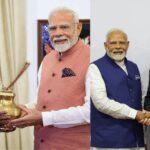Kamala Harris’s keynote address to US Democrats on Thursday night had an audience far from the convention hall in Chicago: policymakers in Beijing.
For China’s leaders, who were preparing for what they saw as an unpalatable choice between two known hawks in incumbent Joe Biden and his Republican rival Donald Trump, Harris’s sudden elevation last month added more uncertainty to what was already a crucial election for US-China relations.
President Xi Jinping’s administration will be now parsing the vice-president’s statements and record for clues of what a Harris administration’s stance would be towards relations with Beijing — and whether it would be preferable to a second Trump term.
“Trump and Kamala Harris are two bowls of poison for Beijing,” said Zhao Minghao, a professor of the Institute of International Studies and Center for American Studies at Fudan University. “Both see China as a competitor or even an adversary.”
While Harris co-sponsored bills when she was a senator defending human rights in Hong Kong and Xinjiang, the north-western region where Beijing has detained nearly 1mn mainly Uyghur Muslim minorities, Trump launched the trade war, and has pledged higher tariffs on Chinese goods if he wins again.
Harris mentioned China just once in her speech to the Democratic convention, vowing to ensure “that America — not China — wins the competition for the 21st century”.
Trump, by contrast, referred to China 14 times at the Republican National Convention last month, including boasting that he had kept Beijing “at bay” during his presidency and bemoaning the loss of Bagram Air Base in Afghanistan, which he claimed was “one hour away from where China makes their nuclear weapons”, an implicit threat.
“People know a lot about Trump, about how he intends to govern if elected,” said Thomas Qitong Cao, assistant professor at Tufts University’s Fletcher School of international affairs. “Whereas for Harris, there’s still a lot of mystery.”

Before becoming vice-president, Harris — who has never been to China — had relatively little exposure to foreign affairs. Since taking office, she has travelled overseas 17 times, including making four visits to east Asia, where she briefly met Xi in Thailand in 2022 and rubbed shoulders with his number two, premier Li Qiang, in Jakarta last year.
Most Chinese academics said that more important than Harris’s record in the less powerful position of vice-president was whether she would retain members of Biden’s foreign policy team, such as secretary of state Antony Blinken, his deputy Kurt Campbell and national security adviser Jake Sullivan, as well as other senior officials who have been instrumental to hawkish policies on China.
Uncertainty over her team has left not only Beijing but even experts in Washington rushing to work out who she would pick for important positions on the region, particularly China. Her national security adviser as vice-president, Philip Gordon, is not an Asia expert.
“What really matters is who she trusts because she is not an expert on foreign affairs,” said Wang Chong, a foreign policy expert at Zhejiang International Studies University, who added that Harris’s nomination came as a “surprise” for many in China.
Her running mate, Tim Walz, had the potential to bring a more personal touch to bilateral relations, some Chinese analysts said. While Walz, who first visited China decades ago as a young teacher, has been sharply critical of the Chinese Communist party, he is remembered fondly by those he interacted with in the country.
Walz has also met the Dalai Lama, whose meeting last week with US officials sparked anger from Beijing.
“His personal qualities made me feel that the outside world was friendly,” said Christy Dai, one of his former students at Foshan No 1 High School, where Walz taught in 1989. “If there’s a world leader like him”, international affairs could move in the “right direction”, she told the Financial Times.
But “just because a person knows about China, that doesn’t mean they support China”, Wang said.

While Biden has rallied US allies to impose export controls on advanced technology and components to China and deepen security co-operation in the region, his officials have also tried to foster communication with Beijing.
“Biden’s officials have been emphasising that the US doesn’t want decoupling, they want de-risking,” Fudan’s Zhao said, adding that the softer tone was in response to pressure from business to de-escalate tensions and showed that Democrats were able to “listen to society”.
He suggested that there would be more continuity and predictability from a Harris presidency than “Trump 2.0”.
Chinese policymakers fear that a Trump administration, rather than pursuing a policy of “managing competition”, would seek “victory” in a new cold war whose ultimate aim many analysts suspect is regime change. For the Communist party, this would be an existential threat.
“China can only and will only wish the lesser of two evils elected,” said Shi Yinhong, professor of international relations at Renmin University in Beijing.

Some analysts argue that another Trump presidency would benefit China by sowing domestic chaos in the US and upending Washington’s foreign alliances and trade partnerships. Trump’s warmth towards Russian President Vladimir Putin would also blunt western efforts to put pressure on Beijing over its tacit support for Moscow’s war in Ukraine.
But Shi cautioned against such hopes. During his first term, Trump revived the Quad alliance with Japan, Australia and India, enacted the Taiwan Travel Act allowing high-level officials from each country to visit and initiated trade hostilities against China.
Others pointed to Trump’s antagonism towards Beijing over the Covid-19 pandemic, which he called labelled the “China virus”.
“From March 2020, he became hysterical towards China,” Shi said.
Harris, he added, “does not make overthrowing the Chinese government an open, programmatic goal, and has much greater policy predictability than Trump”.





